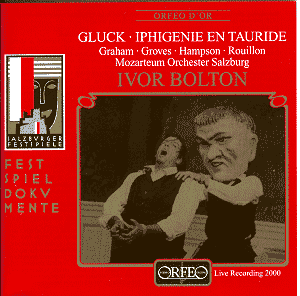First performed in Paris on 18th May 1779, Iphigénie
en Tauride was Gluck's last important work, and is his greatest opera.
Its libretto, by Nicholas-François Guillard, is the finest poem
set by the composer, and the opera as a whole comes as close as possible
to the ideal Gluck sought, of a modern revival of the spirit of Greek
tragedy. In this way it became in the fullness of time the inspiration
for the classical scenes created by Bellini, Berlioz and Strauss.
Iphigénie en Tauride is well represented in
the catalogue of recorded music, and this new version enters a competitive
field. While it does not move ahead of the versions conducted by John
Eliot Gardiner (Philips 416 148 2PH2), Martin Pearlman (Sony S2K52492)
and Marc Minkowski (Archiv 471 133 2AH2), as a performance it has sufficient
strengths to be taken very seriously indeed.
This new Orfeo issue is a live recording of a performance which took
place in the courtyard of the old Archbishop's Residenz during the 2000
Salzburg Festival. The sound is at least good, at best excellence, and
it captures the electricity of the occasion. Make no mistake, Ivor Bolton
conducts a very exciting performance, making the most of the music's
dramatic opportunities, particularly by pushing the tempo to extremes.
Thus the exciting storm music with which the opera opens is pushed very
hard, while the more reflective and emotional sides of the opera are
indulged with slow, expressive pacing and sensitive phrasing. The cast
responds keenly to these initiatives, and the sense of ensemble is palpable.
The Salzburg Orchestra plays with an intensity which
is a tribute to their skill and commitment, as well as to their relationship
with their British conductor. Some might say that the result of this
somewhat romanticised, interpreted vision of the work is to deny its
essential nature as an example from the (earlier) classical period.
There is mileage in such a view, but the music is strong enough to respond
to varying interpretations, and this is one option. The rival versions,
in their various ways, offer the listener a more refined, noble vision
of Gluck's masterpiece.
The production was updated to a modern hospital ward,
with (it seems) some of the characters wearing giant heads as if to
emphasise their natures. This much is confirmed by the illustration
on the front of the box. Of these unfortunate indulgences, there are
thankfully no indications for the listener, and the performance is musically
strong and sincere.
The singing is very fine. Susan Graham really interprets
her character: her Iphigénie is emotionally involved in every
way, her solos and her ensemble singing equally distinguished. Thomas
Hampson makes a noble Oreste, imposing of voice and bringing out the
dark tragedy of the role; he is also particularly effective in articulating
the words during recitative passages. I also liked the Pylade of Paul
Groves. Too light a voice can make this character seem overwhelmed by
his friend Oreste, and that is not the case here. Likewise Philippe
Rouillon is an impressive Thoas. This is not a big role but the appearances
of the character come at crucial moments in the drama, and the impression
made therefore needs to be strong. The choral singing is good but not
outstanding, probably reflecting limited rehearsal time.
Anyone coming afresh to this opera will admire and
enjoy this recording of it. The sound is good, the singing is good,
the orchestral playing is good, and the interpretation is nothing if
not dramatic. However, in a competitive market Orfeo have made some
major errors as concerns their booklet. First - and worst - there is
no libretto. Nor is there much information about Gluck and his work.
Rather the content is given over to indulging the success of this particular
production. It is nice to know that the critics had positive things
to say about it, but as far as concerns the lasting document which is
a recording, it is hardly relevant when indulged on this scale. For
these reasons this new version, whatever its strengths, ranks fourth
out of the four currently available recordings, which is a pity.
Terry Barfoot


